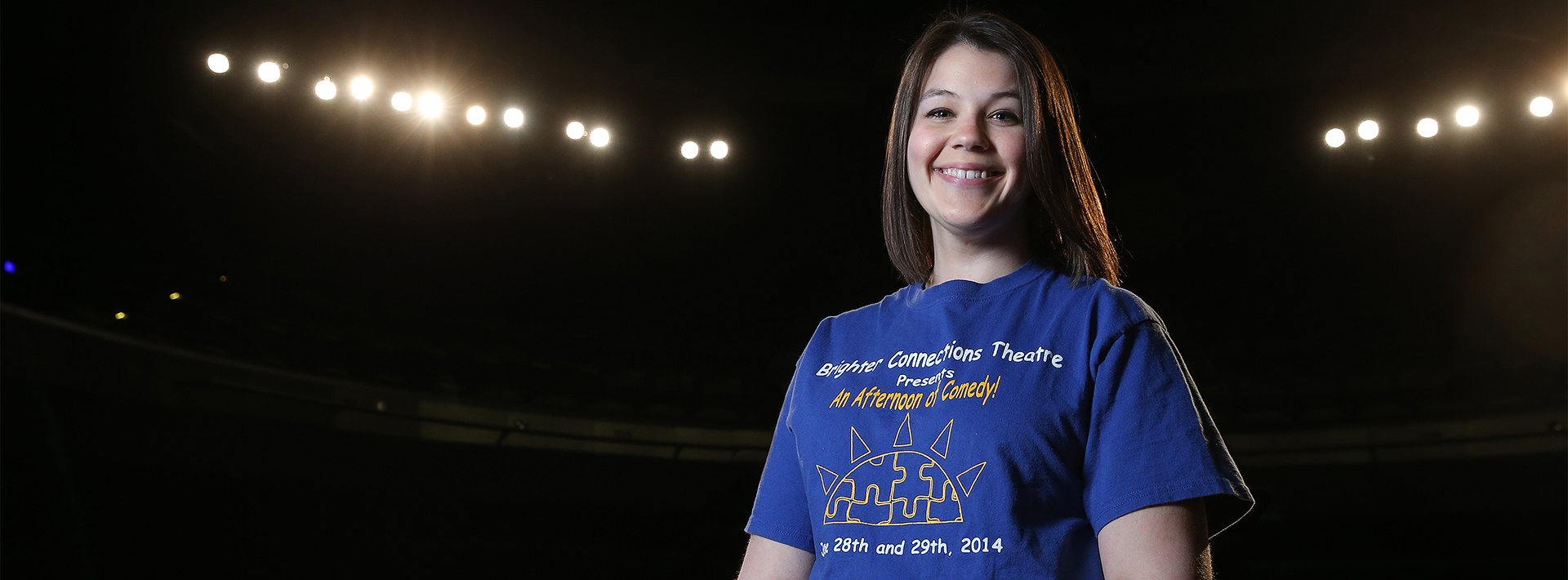Class of 2015 Success Stories: All the world is a stage
Graduate develops theatre program for autistic children

By Julie Jardine
Katie O’Leary believes that if you are flexible enough to believe that anything can go wrong at any time, but it can also go incredibly right, things will probably turn out okay.
It’s her mantra, one that will undoubtedly serve her well in her work as a moderate to intensive intervention specialist as she begins her teaching career. With a minor in theatre and a penchant for improvisational performances, O’Leary has a gift for thinking on her feet.
During her senior year of high school, while babysitting some children on the Autism Spectrum Disorder, she found her calling. “It just felt like this is where I belong.”
“It holds a lot of potential to positively affect the different neural configurations of a child affected with Autism Spectrum Disorders. It is a safe and less threatening way for them to work through issues and model appropriate behavior.”O’Leary’s natural adaptable nature and out-of-the-box thinking led the Honors College graduate to create Brighter Connections Theatre in 2013 in Dayton. The six-week summer program, now in its third year, is designed for students ages 8-14 with Autism Spectrum Disorders. She received BGSU’s Mayeux Award for Outstanding Honors Project for her research and creation of the program.
“I created Brighter Connections Theatre for my Honors capstone project,” explained O’Leary, a native of Vandalia, Ohio. The Honors Project is a self-designed capstone program that showcases the breadth and depth of an honors student’s learning within a fairly defined area.
“Drama therapy for those with autism is a quickly growing field,” she said. “It holds a lot of potential to positively affect the different neural configurations of a child affected with Autism Spectrum Disorders. It is a safe and less threatening way for them to work through issues and model appropriate behavior.”
Six volunteers, all college students studying in areas such as psychology, intervention services, family studies, and other related areas, assisted her with the program. Four of the seven children who participated and their parents agreed to be research participants.
Like a standard theatre production, the ultimate result of Brighter Connections is a play. Unlike standard theatres, O’Leary and her volunteers use workshops, role-playing and improvisational skits to work on behaviors that were identified when the program began.
“Things that come very naturally to many children can be very challenging for children with autism,” she said. “We find if we role play and provide synthetic opportunities for these children, it’s less threatening for them to learn and practice some behaviors.
“We give each child a role that coincides with their target behaviors for the program. They learn how to behave through a different character that they are assigned. The overall common goal is to work successfully with peers.”
“I had several students who spent much of the first two weeks running around the room, shouting and refusing to sit down (much less sit still),” she said. “However, when participating, I could ask one of these students to show me how a turtle acts and the student would crouch down and slowly walk on all fours. In contrast, I could ask a usually lethargic student to show me how fast a cheetah is, and the student would jump up and run across the room with more energy than I thought was possible from him.”
O’Leary said group skits were designed to be intentionally funny. “Not only did I want the students to become aware of the audience laughter, I also wanted them to understand that they were not being laughed at; the laughter was a positive sign.”
Role-playing is central to the work of Brighter Connections.
“In role playing, our goal is for the student to apply the new skill in real life,” she said. “We covered a wide range of topics: handling bullies, helping a friend who is being bullied, abrupt schedule changes, responding to invitations to play (in specific places such as a park), initiating play, learning to ask someone questions while conversing in order to learn more about them, and introducing yourself to new people.”
The program requires incredible flexibility.
“We know that what a student is feeling at 6 p.m. on a Tuesday may be totally different than what they are feeling at 6 p.m. on Wednesday. That’s why I always try to be ready for anything to go wrong, or anything to go right.”
Brighter Connections Theatre was initially funded by a grant through BGSU’s Center for Undergraduate Research and Scholarship. For its second year, O’Leary launched an online Kickstarter campaign to secure funding.
“After our first production, the community took note of what we are doing, and several donors have come forward to support Brighter Connections.”
O’Leary, who has performed on campus as part of the female improvisation group, and served as the membership chair for the BGSU Student Council for Exceptional Children, said Brighter Connections is the high point of her college career.
“I could not have been more proud to see all seven of the participants come together after six weeks and put on a show that they were responsible for.
“The students taught me to be more patient and to always do my best to look for an alternative solution in every situation. I’ve learned to problem solve on the spot.”
Many of the students returned the second year, eager to participate again. “When they come back we set new goals for them so that we can challenge them with new things.”
O’Leary is exploring job opportunities in both Cleveland and Columbus and will be teaching in a high needs school for four years as part of a scholarship agreement.
“I would love to replicate Brighter Connections Theatre in other cities.”
Updated: 12/02/2017 12:46AM
